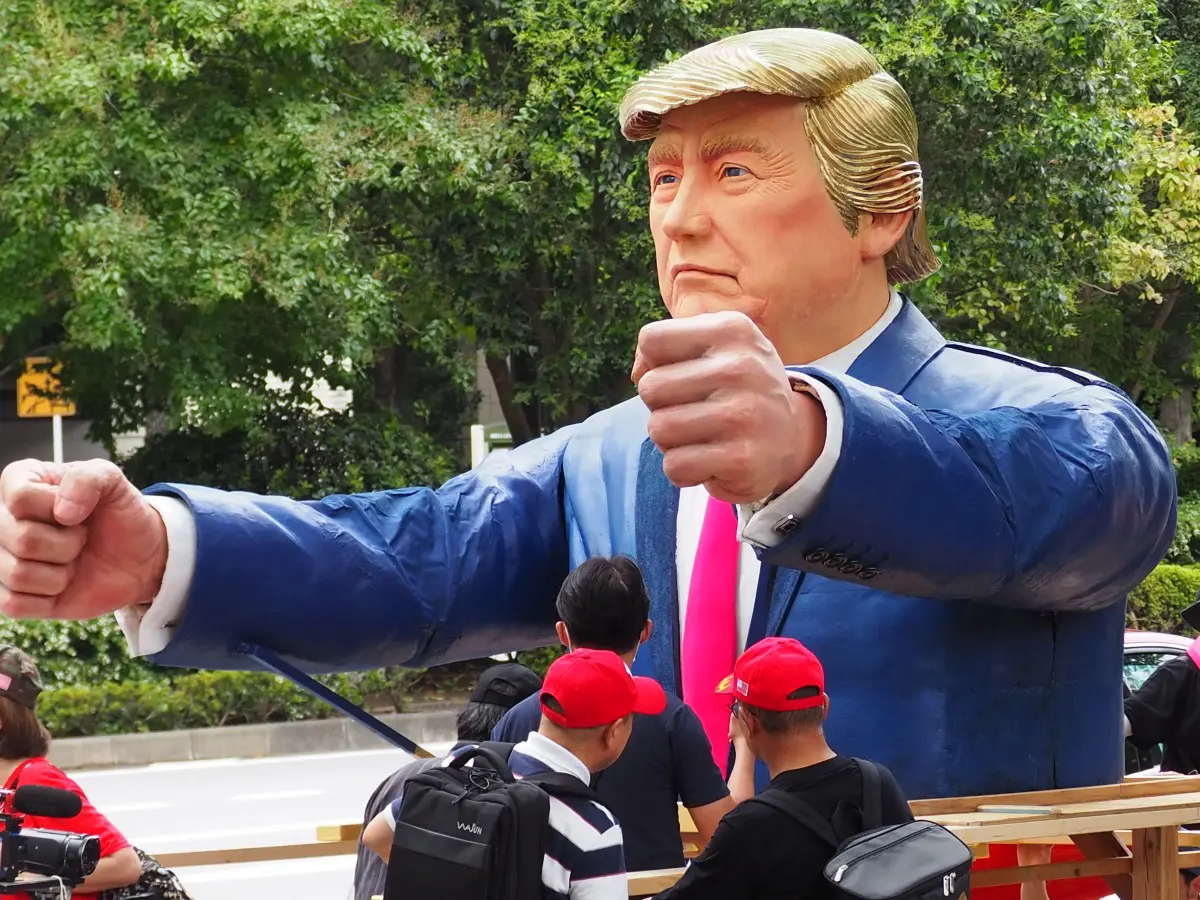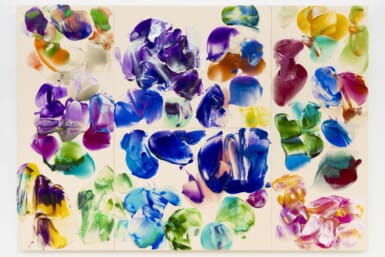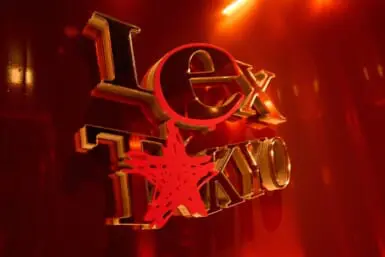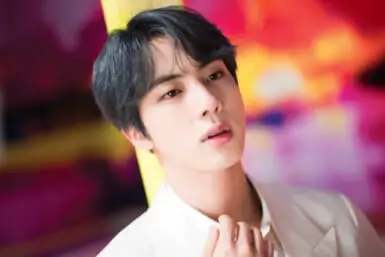Osaka became the unlikely stage for a pro-Donald Trump march on October 28. Clad in unmistakable red MAGA caps, marchers paraded through the streets, hoisting an oversized mikoshi — a portable Shinto shrine — depicting a realistic-looking Donald Trump with flashing eyes that seemed to scan the crowd.
Even more bizarrely, this mikoshi was flanked by a mural of the former president’s face superimposed on none other than Thomas the Tank Engine. The scene was punctuated by the deafening sound of MAGA slogans blaring from loudspeakers as US and Japanese flags waved side by side.
Among the more theatrical elements of this gathering was a procession of marchers brandishing a banner featuring Trump alongside the words “Fight, Fight, Fight!” This is a reference to the recent shooting incident in Butler, Pennsylvania. The same mikoshi had previously been paraded at a pro-Trump event in Tokyo just weeks earlier.
A flier for the rally read, “God Protected Trump, Victory Is Certain!” — a rallying cry that encapsulated the fervent devotion and theatricality of this strange spectacle.
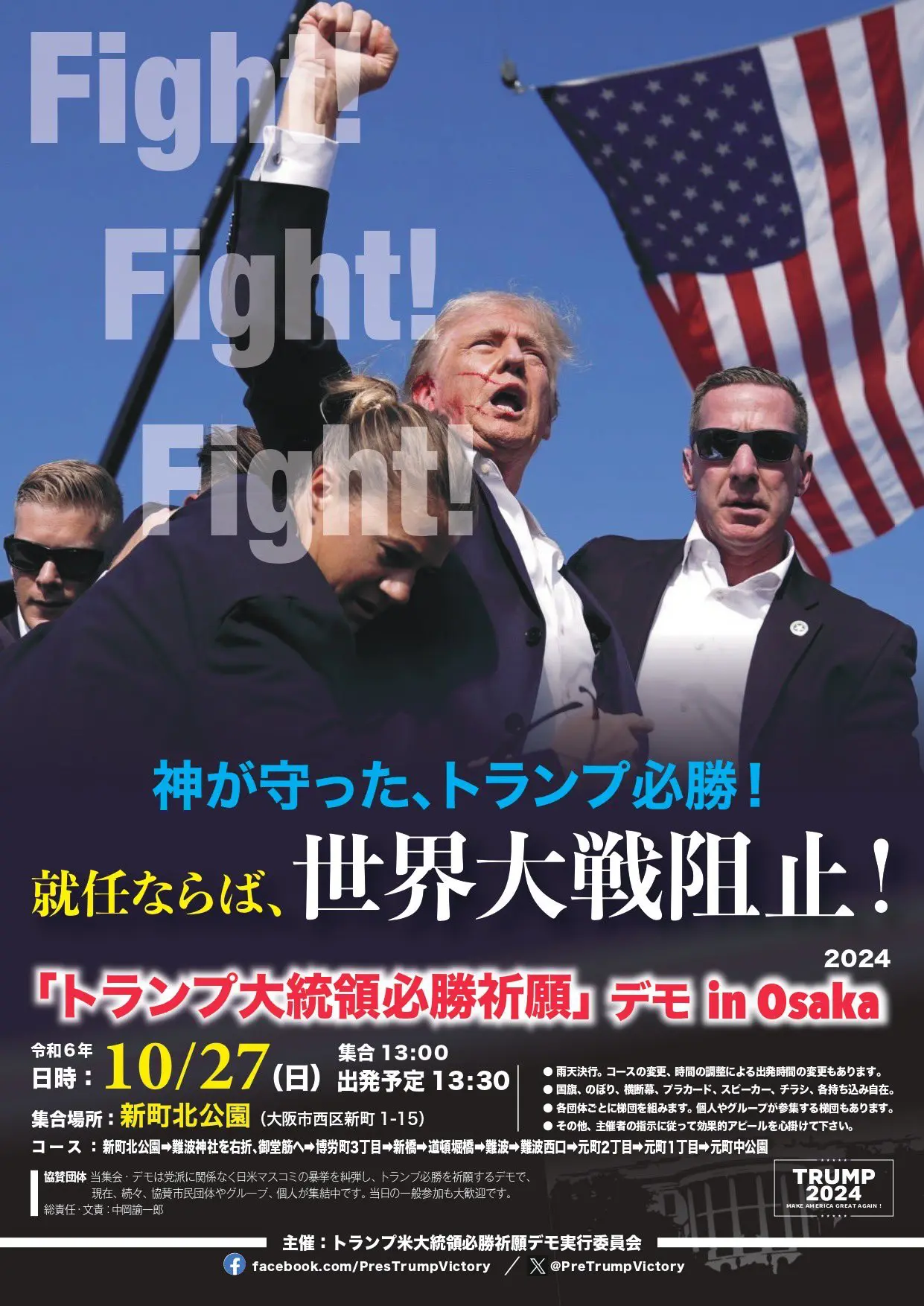
A poster for Osaka’s rally
Japan’s QAnon Phenomenon
The emergence of this rally in Japan is intertwined with the global rise of conspiracy theories, particularly those propagated by QAnon, a far-right movement whose core belief is that a cabal of Satanic child molesters is operating a global child sex trafficking ring that conspired against Trump. In Japan, this gathering of oddities has collectively been dubbed “JAnon,” a nod to the American QAnon conspiracy movement. These individuals enthusiastically import and translate conspiracy theories from the US to Japan.
In April 2022, members of a group called Shin-MitoQ stormed a COVID-19 vaccination site in Shibuya, leading to arrests that included the group’s leader and a mix of seniors and middle-aged individuals. These JAnon followers also view Trump as a champion against what they term the “Deep State” that they believe manipulates world events.
While Japan’s Christians comprise less than 1% of the population, JAnon has taken a unique twist on classic conspiracy theories, particularly focusing on anti-vaccine sentiments. It claims the COVID-19 vaccine is a nefarious plot orchestrated by prominent figures like Bill Gates.
A small pro-Trump demonstration was held in Osaka today with the same giant Trump mikoshi that was used in a similar demonstration in Tokyo. The previous demonstration was organized by people affiliated with foreign religious groups. pic.twitter.com/B54z5S3Dyw
— Jeffrey J. Hall (@mrjeffu) October 27, 2024
Jeffrey J. Hall, a lecturer at Kanda University of International Studies, documented the Osaka rally on X, revealing that it was orchestrated by individuals linked to foreign religious groups, particularly the Sanctuary Church — an offshoot of the Unification Church founded by Sun Myung Moon. This group is often described as “QAnon adjacent.”
A recent report from The Mainichi Shimbun detailed a fall 2024 festival by the Sanctuary Church in Greeley, Pennsylvania, where around 300 Japanese members arrived by bus to rally support for Trump’s campaign. There, Korean-American leader Hyung Jin Moon — son of Sun Myung Moon — donned a crown made of bullet casings and brandished a golden gun, while calling for allegiance to the ex-president.
“Jesus is calling us. Become the hands and feet of Trump. Reject being the hands and feet of Satan (the devil),” Moon reportedly said. “Jesus chose Trump to lead during this crisis. To save America and the world from a third world war.”
The crowd was primarily composed of ultra-MAGA supporters who staunchly believe Trump rightfully won the 2020 election and view the Democratic Party as a demonic force bent on dismantling traditional family values. To them, the upcoming presidential election represents a “battle between good and evil.”
Their zeal reflects a fascination with the outlandish narratives that have taken root in certain corners of American politics, demonstrating how easily such ideas can transcend borders. Nevertheless, these individuals are a distinct minority, vastly removed from the mainstream currents of Japanese political sentiment.
The Stark Reality
Despite the spirited display, polls suggest that support for Trump in Japan is low. An August survey by Reuters indicated that some 43% of Japanese firms said they preferred Harris, compared to just 9% for Trump.
Political analysts, including former Secretary of Defense William Cohen, have voiced concerns about the implications of a potential second Trump presidency for Japan. Cohen remarked on Trump’s general disdain for formal alliances, pointing to his skepticism regarding the US military presence in Japan as a significant point of concern.
Moreover, the irony of Trump’s tariffs on Japanese imports, including a notable 25% levy on steel during his presidency, does not go unnoticed among those participating in the surveys. If re-elected, Trump has threatened to impose a 10% tariff on all imports and a staggering 60% tariff on imports from China.
Masatoshi Kaku, chairperson of the Japan Paper Association, has warned that Japan’s economy could face collapse if China’s economy falters due to these tariffs. Such economic threats make it difficult to reconcile the fervent support for Trump from his Japanese followers with the reality that many in Japan would likely suffer from his proposed trade policies.
As the rally unfolded, the enthusiasm of the Osaka pro-Trump supporters stood in stark contrast to the realities facing the average Japanese citizen. This peculiar phenomenon invites unsettling questions about the intersection of faith, fanaticism and the lengths to which some will go to idolize a controversial figure.

